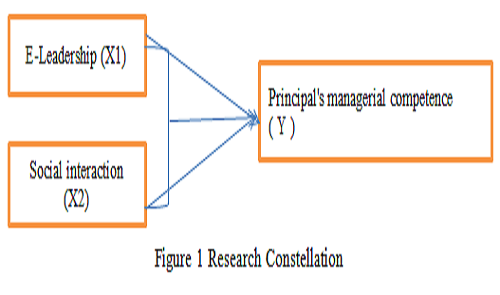
Effect of E-Leadership and Social Interaction on Managerial Competency of Junior High School Principles
Abstract
Keywords
Full Text:
PDFReferences
Anwaruddin, Awang, (2009). Faktor kunci pengembangan kapasitas teknologi informasi dan komunikasi daerah. Puslitbang Sistem Informasi dan Otomasi Administrasi.
Avolio, B. J., Kahai, S., & Dodge, G. E. (2000). E-leadership: Implications for theory, research, and practice. The leadership quarterly, 11(4), 615-668.
Avolio, B. J., Sosik, J. J., Kahai, S. S., & Baker, B. (2014). E-leadership: Re-examining transformations in leadership source and transmission. The Leadership Quarterly, 25(1), 105-131..
Blau,I., & Presser,O.(2013). E‐Leadership of school principals: Increasing school effectiveness by a school data management system. British Journal of Educational Technology, 44(6), 1000-1011
Misra, D. C. (2009) Management development institute, Gurgaon, September 18, 2009 © Dr D.C.Misra.
Efriza, R., Caska, C., & Makhdalena, M. (2020). Analysis of Factors Affecting Student Learning Achievement of Social Sciences Subjects in Muhammadiyah Middle School Rokan Hulu Regency. Journal of Educational Sciences, 4(3), 529-540.
Faiyol, Henry. (2020). Fungsi manajemen. Jurnal Manajemen.com. https://jurnalmanajemen.com/fungsi-manajemen-menurut-henry-fayol.
Gençer, M. S., & Samur, Y. (2016). Leadership styles and technology: Leadership competency level of educational leaders. Procedia-Social and Behavioral Sciences, 229, 226-233.
Hardjana, A. (2019). Komunikasi organisasi: strategi interaksi dan kepemimpinan. Depok: Rajawali Pers Divisi Buku Perguruan Tinggi PT Raja Grafindo Persada.
Hidayati, N., Kartikowati, S., & Gimin, G. (2021). The Influence of Income Level, Financial Literature, and Social Media Use on Teachers Consumption Behavior. Journal of Educational Sciences, 5(3), 479-490.
Kompri. (2017), Standardisasi kompetensi kepala sekolah. Jakarta: Kencana.
Kusuma, A. M., Budiwibowo, S., & Amah, N. (2017). Pengaruh kepemimpinan kepala sekolah dan komunikasi internal terhadap efektivitas kerja guru SMK PGRI Wonoasri. Assets: Jurnal Akuntansi dan Pendidikan, 5(1), 41-52.
Menristekdikti.(2018). Pengembangan iptek dan pendidikan tinggi di era revolusi industri 4.0. https://ristekdikti.go.id/pengembangan-iptek-dan-pendidikan-tinggi-di-era-revo-lusi-industri-4-0-2/.
Mohammad, K. (2009). E-Leadership: the emerging new leadership for the virtual organization. Journal of Managerial Sciences, 3(1).
Mulyasa, E. (2012). Manajemen dan kepemimpinan kepala sekolah. Jakarta: Bumi Aksara.
Ningsih, F., Murni, A., & Roza, Y. (2020). Development of Learning Tools with the Application of Learning Inventions to Improve Mathematical Problem Solving Ability Social Arithmetic Material. Journal of Educational Sciences, 4(1), 44-52.
Permendiknas. (2007). Nomor 13 Tahun 2007 tentang Standar kepala sekolah-/madrasah. Jakarta: Depdiknas.
Permendiknas. (2014). Undang-Undang Republik Indonesia Nomor 5 Tahun 2014 tentang Aparatur sipil negara. Jakarta: Depdiknas.
Priansa, D. J., & Sule, E. T. (2018). Kepemimpinan dan Perilaku Organisasi; Membangun Roganisasi Unggul di Era Perubahan. Bandung: Replika.
Renu, A. A. (2014). E-leadership-a new and modern style of leadership. Int J Adv Manag Econ, 3(5), 88-93.
Savolainen, T. (2014). Trust-building in e-leadership: A case study of leaders' challenges and skills in technology-mediated interaction. Journal of Global Business Issues, 8(2).
Setyabudi, Djoko. (2020). Komunikasi dan Interaksi Sosial. Jakarta: Universitas Terbuka.
Soekanto, Soerjono. (2012). Sosiologi suatu pengantar. Bandung: PT. Raja Grafindo.
Suhertland, (2017). Menjauhkan yang dekat, mendekatkan yang jauh. Dirjen Pendidikan Anak Usia Dini . Jakarta: Kementrian Pendidikan dan Kebudayaan.
Sugiyo. (2005). Komunikasi antar pribadi. Semarang: UNNES Pres.
Suryana, Asep. (2020) Modul konsep dasar kepemimpinan. Universitas Terbuka. http://www.pustaka.ut.ac.id.
Thoha, Miftah. (2019). Kepemimpinan dalam manajemen. Jakarta: Rajawali Pers.
Willdahlia, A. G. (2015). Pengaruh E-Leadership dan Kualitas Sistem Informasi Manajemen (SIM) Terhadap Proses Manajemen Pada Fakultas Kedokteran dan Ilmu Kesehatan Universitas Warmadewa. S@ CIES, 6(1), 85-91.
DOI: http://dx.doi.org/10.31258/jes.5.4.p.611-621
Refbacks
- There are currently no refbacks.
Copyright (c) 2021 jumaiyah jumaiyah

This work is licensed under a Creative Commons Attribution 4.0 International License.
Publisher: FKIP Universitas Riau












